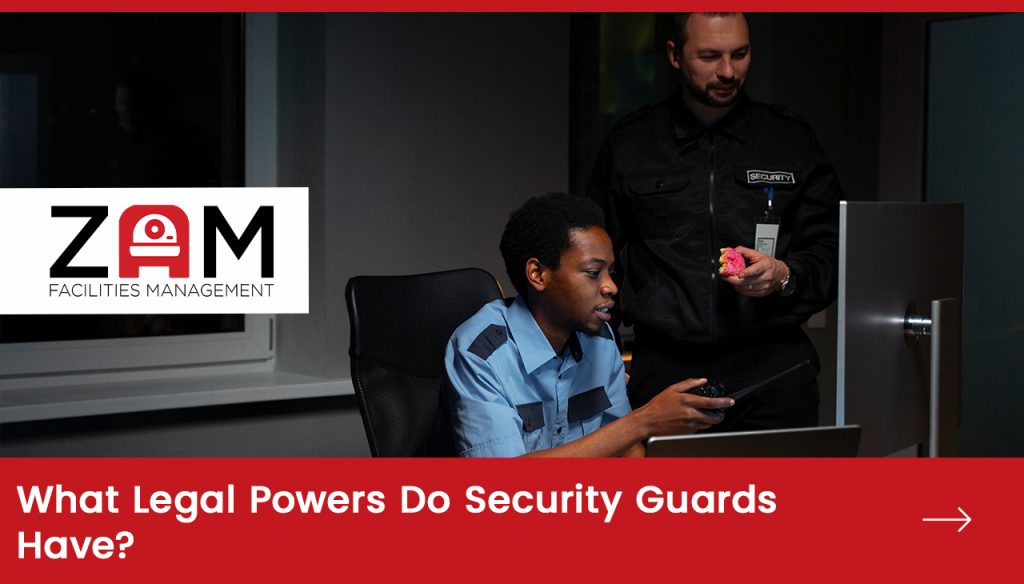As a business owner or event organizer, guaranteeing the wellbeing and security of your premises, staff, and guests is a first concern. While hiring professional security guards can provide an added layer of protection, it’s essential to understand the legal boundaries within which they operate. Let’s dive into security guards’ legal powers and shed some light on what they can and cannot do.
The essential job of safety officers is to keep a free from even a hint of harm climate, deflect expected dangers, and answer instantly to episodes. However, contrary to popular belief, security guards are not law enforcement officers and do not possess the same legal powers as police officers. Their authority stems from specific laws and regulations that outline their responsibilities and limitations.
Blog Outline
ToggleWhat Can Security Guards Legally Do?
- Detain Individuals: Under the Police and Criminal Evidence Act 1984, security guards, like any civilian, can detain an individual if they witness a crime being committed, have reasonable grounds to believe a crime is occurring, or if a crime has been committed, and the suspected perpetrator is identified. This detention can be carried out to prevent physical injury or property damage or to prevent the individual from fleeing before the police arrive.
- Use Reasonable Force: Section 3 of the Criminal Law Act 1967 allows security guards to use reasonable force to prevent crimes from occurring or to detain individuals committing offences. However, the use of weapons is strictly prohibited.
- Work with Security Dogs: The Guard Dogs Act 1975 permits security guards to work with trained security dogs, provided the dogs are always on a leash and under control. Proper warning signs must be displayed when security dogs are present.
- Search with Permission: Security guards can search individuals or their belongings with their consent. However, forced searches are prohibited, even if a crime is suspected. In some instances, such as abandoned property or medical emergencies, searches may be permissible without consent.
- Refuse Entry: Security guards have the authority to refuse entry to individuals who refuse to comply with reasonable security measures, such as bag searches at museums, airports, clubs, or sports stadiums. This measure aims to prevent illegal activities or potential security threats.
SIA Licenses and Training
It’s important to note that security guards must possess a valid Security Industry Authority (SIA) license to perform specific tasks, such as CCTV surveillance, key holding, vehicle immobilization, cash and valuables in transit, or close protection. The SIA license ensures that security guards receive proper training in protecting themselves, the public, and your business.
FAQs
Can security guards make arrests?
No, they do not have the legal authority to do so. They can only detain individuals until the police arrive.
Are security guards allowed to carry weapons?
No, security guards are not permitted to carry weapons while on duty.
Can security guards search someone’s belongings without consent?
Security guards cannot search an individual’s belongings without permission, except in circumstances like abandoned property or medical emergencies.
Do security guards have the same powers as police officers?
Security guards do not have the same legal powers as police officers. Their authority is limited to specific situations outlined by law.
Is it mandatory for security guards to have an SIA license?
Security guards must possess a valid SIA license to perform specific duties, such as CCTV surveillance, key holding, vehicle immobilization, cash and valuables in transit, or close protection.
Remember, while safety officers assume a significant part in keeping a completely safe climate, their powers are restricted by regulation. Understanding these boundaries is essential to ensuring compliance and avoiding any legal complications. If you have specific concerns or require further clarification, it’s always advisable to consult with legal professionals or relevant authorities.
Contact Detail
For Security Contact Us!
- Number: +44 0161 791 5300
- Email: info@zamfm.co.uk
- Address: 1b First Floor, Bank House The Paddock, Handforth, Wilmslow, England, SK9 3HQ
